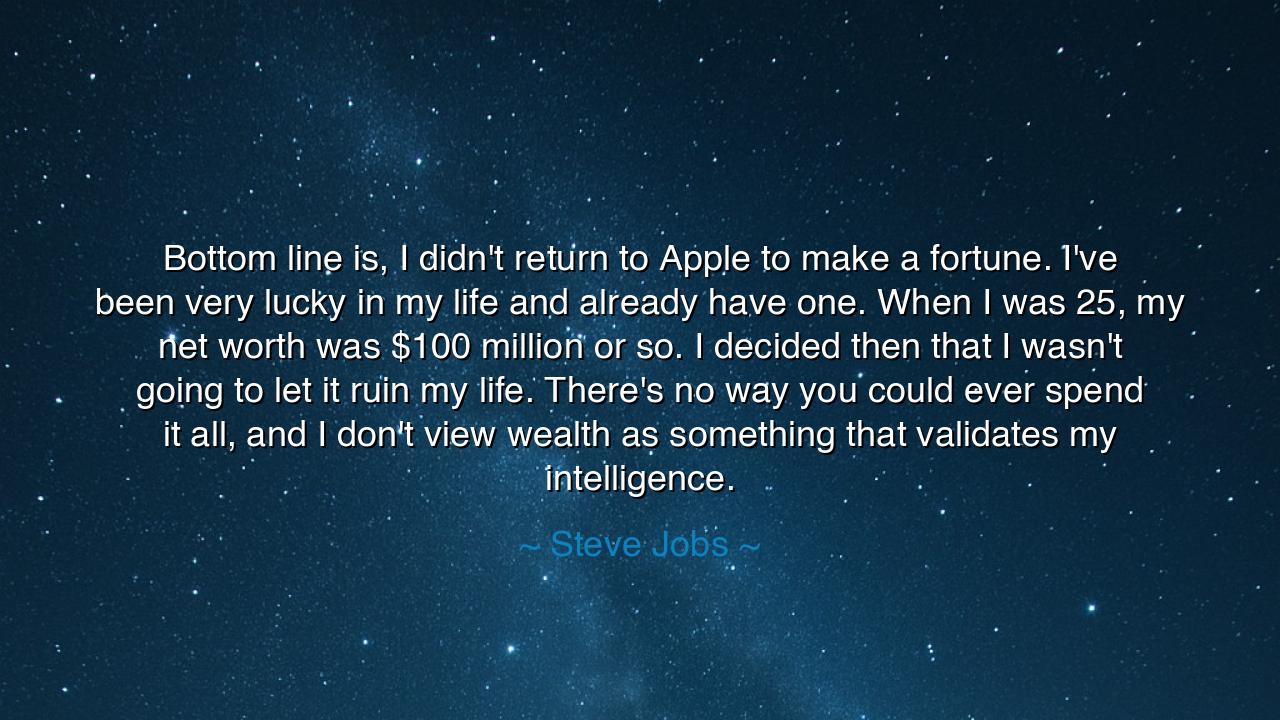
Bottom line is, I didn't return to Apple to make a fortune. I've
Bottom line is, I didn't return to Apple to make a fortune. I've been very lucky in my life and already have one. When I was 25, my net worth was $100 million or so. I decided then that I wasn't going to let it ruin my life. There's no way you could ever spend it all, and I don't view wealth as something that validates my intelligence.






"Bottom line is, I didn't return to Apple to make a fortune. I've been very lucky in my life and already have one. When I was 25, my net worth was $100 million or so. I decided then that I wasn't going to let it ruin my life. There's no way you could ever spend it all, and I don't view wealth as something that validates my intelligence." — Steve Jobs
In these luminous words, Steve Jobs, the visionary founder of Apple, speaks as a philosopher as much as an innovator. He lays bare the truth that wealth, though alluring, is but a shadow of true fulfillment. His return to Apple was not the journey of a man chasing gold, but of one seeking purpose — the sacred alignment of one’s gifts with one’s calling. Here he rejects the illusion that riches can define or complete a person, reminding us that intelligence, creativity, and character cannot be measured in currency. Like the wise men of old, Jobs looked upon fortune not as a crown, but as a test — a test to see whether he would serve it, or make it serve his vision.
The origin of these words lies in the later years of Jobs’s life, when he had already tasted both triumph and exile. He had been the young conqueror of Silicon Valley, the prodigy who built a kingdom from his garage, and then, the outcast — cast away from the very company he had birthed. When he returned to Apple in 1997, it was not for wealth, which he already possessed beyond measure, but for creation, which he could not live without. He returned to build, to imagine, to bring form to beauty and function to thought. His goal was not riches but legacy — the fulfillment of his creative destiny. In this, he became not merely a man of business, but a sage who understood that life’s richest treasure lies in the act of creation itself.
To say, “I decided then that I wasn't going to let it ruin my life,” is to declare a victory over the most ancient of human temptations — greed. For money, like fire, is a dangerous servant and a terrible master. It promises freedom but often brings enslavement. The one who chases it endlessly finds that his soul grows smaller as his fortune grows larger. Jobs, at twenty-five, already saw this truth: that wealth can dull the spirit if one allows it to become an idol. In choosing instead to serve his vision, he placed himself among the wise — those who understand that mastery over desire is greater than mastery over markets.
History is rich with those who learned this same lesson. Consider Marcus Aurelius, emperor of Rome and philosopher of restraint. He ruled over a vast empire, wealth and power beyond counting, yet he wrote in his Meditations, “Wealth consists not in having great possessions, but in having few wants.” Though centuries apart, Jobs and Aurelius share the same wisdom: that greatness lies in the mind, not the treasury; that the pursuit of excellence is holier than the pursuit of gold. The emperor ruled men; the innovator ruled ideas. Both knew that true power comes from discipline of the self, not accumulation of riches.
Jobs’s belief that wealth does not validate intelligence cuts to the heart of modern delusion. In an age that worships numbers — net worth, shares, fame — he reminds us that intellect and worth cannot be bought or sold. The fool may inherit gold, but he cannot buy wisdom. The truly intelligent seek meaning, not money. And the wise understand that while wealth may open doors, it cannot open the soul. The man who creates for love, for truth, for beauty — he walks with gods. The one who creates only for gain — he is already a slave.
This teaching is not a condemnation of success, but a call to clarity of purpose. Wealth is a tool — powerful, necessary, but never divine. It should serve the dream, not replace it. Jobs’s life was proof of this truth: he used fortune to build, not to boast; to innovate, not to idle. He once said, “Being the richest man in the cemetery doesn’t matter to me. Going to bed at night saying we’ve done something wonderful — that’s what matters.” Here, his heart speaks the ancient wisdom of all creators: that joy is found in the doing, not in the owning.
So let this be your lesson, O seeker of meaning: do not let wealth define your worth. Let your work be your mirror, your passion your compass, your impact your treasure. Seek to create what uplifts, what endures, what awakens wonder in the world. If fortune comes, accept it with humility; if it does not, walk on undeterred. For the true fortune of man lies not in what he keeps, but in what he gives, builds, and becomes. As Jobs himself proved through his life and death, a soul devoted to creation is wealth enough to last eternity.






AAdministratorAdministrator
Welcome, honored guests. Please leave a comment, we will respond soon